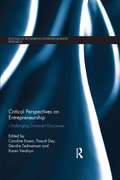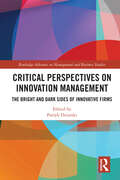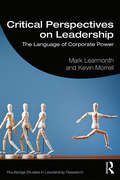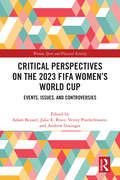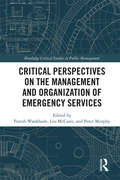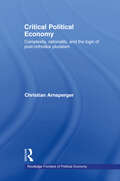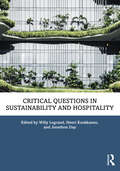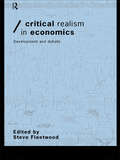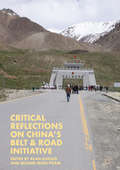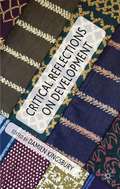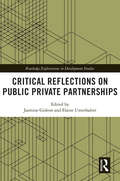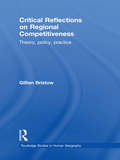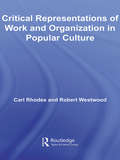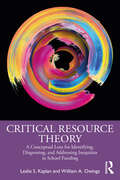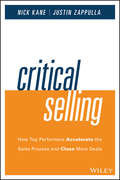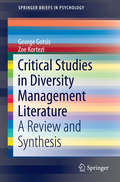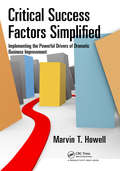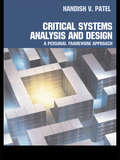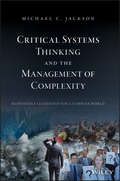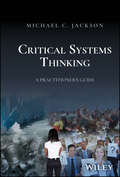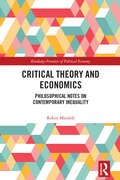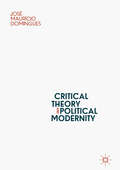- Table View
- List View
Critical Perspectives on Entrepreneurship: Challenging Dominant Discourses (Routledge Rethinking Entrepreneurship Research)
by Karen Verduyn Caroline Essers Pascal Dey Deirdre TedmansonEntrepreneurship is largely considered to be a positive force, driving venture creation and economic growth. Critical Perspectives on Entrepreneurship questions the accepted norms and dominant assumptions of scholarship on the matter, and reveals how they can actually obscure important questions of identity, ideology and inequality. The book’s distinguished authors and editors explore how entrepreneurship study can privilege certain forms of economic action, whilst labelling other, more collective forms of organization and exchange as problematic. Demystifying the archetypal vision of the white, male entrepreneur, this book gives voice to other entrepreneurial subjectivities and engages with the tensions, paradoxes and ambiguities at the heart of the topic. This challenging collection seeks to further the momentum for alternate analyses of the field, and to promote the growing voice of critical entrepreneurship studies. It is a useful tool for researchers, advanced students and policy-makers.
Critical Perspectives on Innovation Management: The Bright and Dark Sides of Innovative Firms (Routledge Advances in Management and Business Studies)
by Patryk DziurskiMost firms perceive innovation as the best way to grow. However, how it can best be manged is still uncleared. While the number of publications on innovation has skyrocketed over the past two decades, it is still increasingly difficult to gain an overview of its most critical aspects. It has been even more challenging that much has been written about the possible benefits of innovation, but there is still lack of understanding of its downsides at the innovative firm level. This can lead to detrimental effects, such as a lower commitment to innovation, a lack of the effective innovation strategy, inappropriate organizational design that does not enhance innovation, and either a too cautious or too risky approach to innovation. Thus, the book aims to explore the concept of innovation management as well as to identify the bright and dark sides of innovation in innovative firms. A better understanding of the positive and negative effects of product and process innovation expands the knowledge base on innovation management and allows managers to manage innovation in a more efficient and effective manner. This book will be valuable to researchers, academics, managers, and advanced students in the fields of management studies, strategy, and organizational studies.
Critical Perspectives on Leadership: The Language of Corporate Power (Routledge Studies in Leadership Research)
by Kevin Morrell Mark LearmonthWithin contemporary culture, ‘leadership’ is seen in ways that appeal to celebrated societal values and norms. As a result, it is becoming difficult to use the language of leadership without at the same time assuming its essentially positive, intrinsically affirmative nature. Within organizations, routinely referring to bosses as ‘leaders’ has, therefore, become both a symptom and a cause of a deep, largely unexamined new conceptual architecture. This architecture underpins how we think about authority and power at work. Capitalism, and its turbo-charged offspring neo-liberalism, have effectively captured ‘leader’ and ‘leadership’ to serve their own purposes. In other words, organizational leadership today is so often a particular kind of insidious conservativism dressed up in radical adjectives. This book makes visible the work that the language of leadership does in perpetuating fictions that are useful for bosses of work organizations. We do this so that we – and anyone who shares similar discomforts – can make a start in unravelling the fiction. We contend that even if our views are contrary to the vast and powerful leadership industry, our basic arguments rest on things that are plain and evident for all to see. Critical Perspectives on Leadership: The Language of Corporate Power will be key reading for students, academics and practitioners in the disciplines of Leadership, Organizational Studies, Critical Management Studies, Sociology and the related disciplines.
Critical Perspectives on Work and Employment in Globalizing India
by Premilla D'Cruz Ernesto NoronhaThis book showcases issues of work and employment in contemporary India through a critical lens, serving as a systematic, scholarly and rigorous resource which provides an alternate view to the glowing metanarrative of the subcontinent's ongoing economic growth in today's globalized world. Critical approaches ensure that divergent and marginalized voices are highlighted, promoting a more measured perspective of entrenched standpoints. In casting social reality differently, a quest for solutions that reshape current dynamics is triggered. The volume spans five thematic areas, subsuming a range of economic sectors. India is a pre-eminent destination for offshoring, underscoring the relevance of global production networks (Theme 1). Yet, the creation of jobs has not transformed employment patterns in the country but rather accentuated informalization and casualization (Theme 2). Indeed, even India's ICT-related sectors, perceived as mascots of modernity and vehicles for upward mobility, raise questions about the extent of social upgrading (Theme 3). Nonetheless, these various developments have not been accompanied by collective action - instead, there is growing evidence of diminished pluralistic employment relations strategies (Theme 4). Emergent concerns about work and employment such as gestational surrogacy and expatriate experiences attest to the evolving complexities associated with offshoring (Theme 5).
Critical Perspectives on the 2023 FIFA Women’s World Cup: Events, Issues, and Controversies (Women, Sport and Physical Activity)
by Adam Beissel Andrew Grainger Verity Postlethwaite Julie E. BriceThis book offers an in- depth examination of the 2023 FIFA Women’s World Cup (2023 FWWC) hosted in Aotearoa New Zealand and Australia. The 2023 FWWC was a landmark event in the history of women’s sport, in terms of audience, revenue, spectacle, and global reach, and has assumed wider significance beyond sport as a result of the controversial events immediately after the final game.Featuring the work of leading researchers from around the world, this book examines some of the key issues that arose during and after the 2023 FWWC. It provides an international perspective on the politics of women’s football and explores topics including media, fandom, Indigeneity, legacy policies, tourism, and the organisational politics and strategies of international federations. It also sheds light on the inherent sexism, gender inequalities, and biased media framings that remain pervasive in the women’s game.This is the second book on the 2023 FWWC from the editorial team of Adam Beissel, Julie E. Brice, Verity Postlethwaite, and Andy Grainger. It is fascinating reading for anybody with an interest in sport studies, event studies, gender studies, sociology, or political science.
Critical Perspectives on the Management and Organization of Emergency Services (Routledge Critical Studies in Public Management)
by Peter Murphy Paresh Wankhade Leo McCannCritical Perspectives in Emergency Services Management makes an important contribution to the subject of emergency services management and to public administration and organization studies more generally. It critically assesses developments in emergency services management by examining the multi-dimensional nature of the provision of emergency services and their connectedness in advanced western democracies. The effective management of emergency services has never been more important than in today’s high-pressured and cost-conscious public sector. The authors of this volume forensically analyse the challenges of delivering emergency services within this context. This book provides an in-depth, scholarly and comprehensive analysis of the changing landscape of emergency service provision and clearly addresses a gap in the market for a critical volume on the emergency services. For anyone seeking to understand why and how the management of emergency services matters, this collection is essential reading.
Critical Political Economy: Complexity, Rationality, and the Logic of Post-Orthodox Pluralism (Routledge Frontiers Of Political Economy Ser. #Vol. 97)
by Christian ArnspergerThis book asks how a more liberating economics could be constructed and taught. It suggests that if economists today are serious about emancipation and empowerment, they will have to radically change their conception about what it means for a citizen to act rationally in a complex society.Arnsperger emphasises that current economics neglects an imp
Critical Questions in Sustainability and Hospitality
by Willy Legrand Henri Kuokkanen Jonathon DayInformed by the scholarly and practical viewpoints of a myriad of internationally recognised experts, this engaging and timely volume poses a set of pertinent questions that cover critical and contemporary sustainability issues in hospitality and tourism and proposes actionable solutions. Embellished with informative tables, diagrams and photographs, key questions and debates are discussed from a variety of angles with proposed solutions by industry practitioners, academics and consultants belonging to the Hospitality Net World Panel on Sustainability in Hospitality. Designed to facilitate contemporary discussion and debate, this book presents constructive dialogues which are designed to lead to action within the hospitality industry and education. Key questions cover the following topics: • Major contemporary sustainability challenges – e.g. climate change, biodiversity loss, impacts of pandemics, water scarcity, human right risks. • Specific hospitality functions or departments – e.g. food and beverage, engineering, health and safety, guest relationship, finance, purchasing, human resources. • Strategic issues related to marketing and stakeholder relationships – e.g. sustainability working groups, return on sustainability investment, marketing and reporting sustainability, certification, supplier relationship, engaging guests. This book is an essential reading for students and academics in the field of hospitality and tourism management, as well as industry professionals searching for answers to the challenges they face in enacting sustainability in their business.
Critical Realism in Economics: Development and Debate (Economics As Social Theory Ser.)
by Steve FleetwoodDrawing on the fields of economic methodology and economic theory, this title opens up new forms of investigation in economics and transforms the nature of economic reasoning. The work combines contributions from authors critical of this approach with those who are concerned to clarify its full implications for contemporary economics. This is a vol
Critical Realist Applications in Organisation and Management Studies
by Steve Fleetwood Stephen AckroydCritical realism has become increasingly important in the way organization and management is studied. This innovative book argues for an alternative to the prevailing ontology, and shows how positivism and its empirical realist ontology can be abandoned without having to accept strong social constructionism. Critical Realist Applications in Organisation and Management Studies applies critical realism in four ways. First, in the removal of meta-theoretical obstacles that hinder the development of fruitful theoretical and empirical work. Second and third, as a meta-theoretical tool with which to develop appropriate methodological and theoretical frameworks which can then be used to inform appropriate empirical work, and finally, all of this is applied across a broad range of subject areas including critical management studies, accountancy, marketing, health care management, operations research, the nature of work, human resource management, labour process theory, regional analysis, and work and labour market studies. Ideal for postgraduates and professionals, this key book will be a valuable resource across a wide range of subjects.
Critical Reflections on China’s Belt & Road Initiative
by Alan Chong Quang Minh PhamThis book provides insights into China's Belt and Road Initiative (BRI) from Asia Pacific and the Middle East. It offers critical perspectives from various directions, not excluding historical investigations, human geography approaches and neo-Marxist inclinations.China’s Belt and Road Initiative (BRI) represents one of the biggest geopolitical visions since the Cold War and offers the possibilities of an intercontinental vision of Aid politics, along with prospects for pan-Asianism. By and large, any geopolitical vision that purports to foster inter-regional dialogue and materialist development of peoples and economies is bound to have its flaws. The Belt and Road Initiative bears hallmarks of the socio-political tradition of Chinese authoritarian infrastructure politics while also offering a possible alternative to the so-called ‘Washington Consensus’ of free markets, deregulation and a shift towards liberal democracy.Additionally, the Belt and Road Initiative opens up wide open intellectual spaces for dialogues between Asians, Arabs and Westerners on the meaning of inclusive inter-continental relationships in philosophy, geography and economics. The significance of this is often underplayed in Chinese official statements whereas this book introduces these possibilities within its assorted sections.
Critical Reflections on Development
by Damien KingsburyDesigned as a critique of the key failures of international development, this book brings together practitioners, policy-makers, researchers, activists, and academics in an attempt to work toward a shared conceptualisation of development by outlining and critically reflecting on their own understanding of development.
Critical Reflections on Public Private Partnerships (Routledge Explorations in Development Studies)
by Jasmine Gideon and Elaine UnterhalterThis book argues that despite the hype within many policy circles, there is actually very little evidence to support the presumed benefits of Public Private Partnerships (PPPs) in reducing poverty and addressing inequalities in the provision of and access to public services. Taking a cross-sectoral comparative approach, this book investigates how PPPs have played out in practice, and what the implications have been for inequalities. Drawing on a range of empirical case studies in education, healthcare, housing and water, the book picks apart the roles of PPPs as financing mechanisms in several international and national contexts and considers the similarities and differences between sectors. The global COVID-19 pandemic has raised significant questions about the future of social provision and through its analysis of the emergence and expansion of the role of PPPs, the book also makes a vital contribution to current discussion over this rapidly changing landscape. Overall, this wide-ranging guide to understanding and evaluating the role of PPPs in the Global South will be useful to researchers within development, international relations, economics, and related fields, as well as to policy makers and practitioners working in development-related policy.
Critical Reflections on Regional Competitiveness: Theory, Policy, Practice (Routledge Studies in Human Geography)
by Gillian BristowSince the early 1990s, governments and development agencies have become increasingly preoccupied with the pursuit of regional competitiveness. However, there is considerable confusion around what exactly regional competitiveness means, how it might be achieved, whether and how it can be measured, and whether it is a meaningful and appropriate goal for regional economies. The central aim of this book is to provide a comprehensive and critical account of these debates with reference to theory, policy and practice, and thus to explore the meaning and value of the concept of regional competitiveness. The book is structured into three parts. Part one introduces the concept of regional competitiveness by tracing its origins and exploring its different meanings in regional economic development. This will critically engage with political economy approaches to understanding the nature and dominance of the competitiveness discourse. Part two interrogates the pursuit of regional competitiveness in policy and practice. This critically evaluates the degree to which the pursuit of competitiveness is encouraging convergence in policy agendas in regions through an examination of key determinants of policy sameness and difference, notably benchmarking and devolved governance. Part three explores the limitations to regional competitiveness and explores whether and how its predominance in the policy discourse might be challenged by alternative agendas such as sustainable development and wellbeing. This focuses on the developing qualitative character of regional development. This volume critically engages with the theory and policy of regional competitiveness, thus providing the first integrated critique of the concept for undergraduate and postgraduate students, as well as academics interested in regional development and policy. It will unpack the concept of regional competitiveness and explain its usefulness, limitations and policy appeal, as well as examining its sustainability in the light of evolving governance structures and the imperatives of broadening regional development agendas.
Critical Representations of Work and Organization in Popular Culture (Routledge Advances in Management and Business Studies #Vol. 37)
by Robert Westwood Carl RhodesThis book challenges traditional organizational theory, looking to representations of work and organizations within popular culture and the ways in which these institutions have also been conceptualized and critiqued there. Through a series of essays, Rhodes and Westwood examine popular culture as a compelling and critical arena in which the complex and contradictory relations that people have with the organizations in which they work are played out. By articulating the knowledge in popular culture with that in theory, they provide new avenues for understanding work organizations as the dominant institutions in contemporary society. Rhodes and Westwood provide a critical review of how organizations are represented in various examples of contemporary popular culture. The book demonstrates how popular culture can be read as an embodiment of knowledge about organizations – often more compelling than those common to theory – and explores the critical potential of such knowledge and the way in which popular culture can reflect on the spirit of resistance, carnivalisation and rebellion.
Critical Resource Theory: A Conceptual Lens for Identifying, Diagnosing, and Addressing Inequities in School Funding
by Leslie S. Kaplan William A. OwingsCritical Resource Theory (CReT) offers an innovative critical perspective on education funding. This new conceptual lens enables school leaders and policy makers to analyze quantitatively school funding policies and practices as a catalyst to make them more equitable. It offers a useful orientation and tool to increase fairness and opportunity in a society that systemically advantages the dominant group with ample resources while it disadvantages others by withholding them. Presenting a balance between the theoretical and its practical application to improve educational outcomes for marginalized children, chapters introduce and discuss this new extension of Critical Theory, validate it as a value-added and complete theory, place it within a broader philosophical framework, and construct its historical, social, political, and educational contexts. Designed for use in school finance and educational policy courses, this book presents an analytical tool that leaders, scholars, and policy makers can use to alter how they view public funding policies and practices – to question their assumptions about funding and resource allocations, look for, identify, and assess inadequacies and inequities, share their findings, and use these data to shape policy recommendations for increased fiscal fairness and improved student outcomes.
Critical Resources for the First Year: Managing the Transition to Management
by Linda A. HillThe transformation from individual contributor to manager is full of challenges. New managers must learn new interpersonal skills, reconcile their own expectations with those of their subordinates and superiors, and manage the stresses of taking on their new identity as managers. How do they do it? Author Linda A. Hill followed nineteen new managers through their first year, gathering data about the managerial transition. In this chapter, we hear from the managers in their own words about the resources they relied upon to help them cope with and master the challenges of the managerial transformation, including their career experience, network of relationships, and formal training. This chapter was originally published as Chapter 8 of "Becoming a Manager: How New Managers Master the Challenges of Leadership."
Critical Selling: How Top Performers Accelerate the Sales Process and Close More Deals
by Justin Zappulla Nick KaneMaster these top-performing sales skills to dominate the marketplace Critical Selling is a dynamic and powerful guide for transforming your sales approach and outperforming your competition. This book is based on Janek Performance Group's, an award winning sales performance company, most popular sales training program, Critical Selling®. Let authors Justin Zappulla and Nick Kane, Managing Partners at Janek, lead you through their flagship sales training methodology to provide you with the strategies, skills and best practices you need to accelerate the sales process and close more deals. From the initial contact to closing the deal, this book details the winning strategies and skills that have supercharged the sales force of program alumni like OptumHealth, Santander Bank, Daimler Trucks, California Casualty, and many more. Concrete, actionable steps show you how to plan a productive sales call, identify customer needs, differentiate yourself from the competition, and wrap up the sale. You'll also learn proven techniques for building rapport, overcoming objections, dealing with price pressures, and handling the million little things that can derail an otherwise positive sales interaction. Sales are the lifeblood of your company. Are they meeting your expectations? What if you could exceed projected sales figures and blow your competition out of the water? This book provides the research-based framework to ignite your sales team and excite your customer base, for sustainable success in today's market. Let Critical Selling® show you how to: Connect with customers on a deeper level to build trust Present a persuasive and value-based solution tailored to your customer’s needs Handle pricing pressure, doubt, and objections with confidence Utilize proven methodologies that help you close the sale Sales is about so much more than exchanging goods or services for cash. It's about relationships, it's about outperforming the competition, it's about demonstrating real value, and it's about understanding and solving people's problems. Critical Selling shows you how to bring it all together, using proven techniques based on real sales performance research.
Critical Studies in Diversity Management Literature: A Review and Synthesis (SpringerBriefs in Psychology)
by George Gotsis Zoe KorteziThis book critically examines current workplace diversity management practices and explores a nuanced framework for undertaking, supporting, and implementing policies that equally favor all people. It presents critical perspectives that not only elevate respect for differences but also provide insights into the nature and dynamics of differences in view of an inclusive and truly participative organizational environment. The book first presents a brief overview of the connotations associated with workplace diversity and its effective management. Next, it focuses on the organizational appropriation of differences through the formation and mediation of various diversity discourses. It demonstrates the particular articulations of these discourses with inequality and oppressive structures that perpetuate structural disadvantage due to existing power disparity between dominant and unprivileged group members. The book then goes on to underscore the need of constructing relational and context-sensitive diversity management frameworks. Overall, the book outlines that current business cases for diversity focus solely on instrumental goals and tangible outcomes and, as a result, fail to fully capture the complexity as well as the particularity of the diversity phenomenon. The book underlines the necessity for a more inclusive paradigm, implying a progressive problem-shift in the dominant diversity research agenda from a market-driven business-oriented diversity management to one highly valuing, affirming, and respecting otherness.
Critical Success Factors Simplified: Implementing the Powerful Drivers of Dramatic Business Improvement
by Marvin T. HowellCritical-to-success factors (CSFs) have become essential elements to strategic planning and no business can achieve consistent success without effectively adopting them. To take full advantage of CSFs, however, an organization must first understand what they are and how they can be used to drive organizational initiatives and processes. Critical Su
Critical Systems Analysis and Design: A Personal Framework Approach
by Nandish PatelTaking a unique approach to systems analysis and design, this insightful book provides learners with a critical personal framework for considering and developing knowledge and practice of systems analysis and design. Each chapter begins by highlighting what can be learned on its completion and ends with a critical skills development section contain
Critical Systems Thinking and the Management of Complexity: Responsible Leadership For A Complex World
by Michael C. JacksonThe world has become increasingly networked and unpredictable. Decision makers at all levels are required to manage the consequences of complexity every day. They must deal with problems that arise unexpectedly, generate uncertainty, are characterised by interconnectivity, and spread across traditional boundaries. Simple solutions to complex problems are usually inadequate and risk exacerbating the original issues. Leaders of international bodies such as the UN, OECD, UNESCO and WHO — and of major business, public sector, charitable, and professional organizations — have all declared that systems thinking is an essential leadership skill for managing the complexity of the economic, social and environmental issues that confront decision makers. Systems thinking must be implemented more generally, and on a wider scale, to address these issues. An evaluation of different systems methodologies suggests that they concentrate on different aspects of complexity. To be in the best position to deal with complexity, decision makers must understand the strengths and weaknesses of the various approaches and learn how to employ them in combination. This is called critical systems thinking. Making use of over 25 case studies, the book offers an account of the development of systems thinking and of major efforts to apply the approach in real-world interventions. Further, it encourages the widespread use of critical systems practice as a means of ensuring responsible leadership in a complex world. Comments on a previous version of the book: Russ Ackoff: ‘the book is the best overview of the field I have seen’ JP van Gigch: ‘Jackson does a masterful job. The book is lucid ...well written and eminently readable’ Professional Manager (Journal of the Chartered Management Institute): ‘Provides an excellent guide and introduction to systems thinking for students of management’
Critical Systems Thinking: A Practitioner's Guide
by Michael C. JacksonCRITICAL SYSTEMSTHINKING Understand the full range of systems approaches and how to use them with this innovative overview. Leaders and managers face increasing complexity and uncertainty because technical, organizational, socio-cultural, political, and environmental issues have become intensely interconnected. Systems thinking is recognized as the essential competence for managing complexity. As the demand for systems thinking grows, however, the fragmentation of the field into different methodologies has become a potential liability. Critical systems thinking (CST) shows how this diversity can be a strength rather than a weakness by revealing how different systems methodologies address various aspects of complexity and how they can be used in combination to resolve the messiest of wicked problems. Critical Systems Thinking offers, in a single volume, an account of the value of systems thinking and CST in the modern world, an explanation of the pragmatic philosophy and expansion in mindset necessary to embrace CST, and detailed instructions on how to undertake critical systems practice (CSP) using the variety of systems approaches to navigate multi-dimensional complexity. Readers will find: An accessible introduction to systems thinking and CST. A description and critique of the best-known systems methodologies. A guide to the mindset changes, the steps required, and the toolkit necessary to undertake successful CSP. Case studies and examples of CSP. A discussion of the nature of systemic leadership. Critical Systems Thinking is ideal for leaders and managers in government, business, the public sector, the professions, and beyond who want to understand the potential of systems thinking and use it in their work. It is essential for systems researchers and practitioners who want a deeper understanding of the field.
Critical Theory and Economics: Philosophical Notes on Contemporary Inequality (Routledge Frontiers of Political Economy)
by Robin MaialehThis book expands upon a range of economic insights within the overall context of critical theory, particularly with respect to the question of socioeconomic inequalities, and presents an explanation of how critical theory provides a number of interesting perspectives for economists. Economic agents, deliberately imprisoned in their instrumental rationality as a means to survive under competitive relationships, are microscopic constituents of systemic forces which exist beyond their will. Despite the subjective rationality of such agents in terms of formally logical transitivity and consistency, aggregate market distributional mechanisms also display non-rational patterns. The crucial aspect of the dynamics of this system consists of the paralysing effect of the high level of socioeconomic inequality, which is driven by a permanent struggle for self-preservation under competitive rules; it is a reminiscence of natural, uncivilised relationships that constituted the reproduction process of the whole. These reified agents thus become instruments of their socially constructed powers on the one hand, and objects of their existential conditionality on the other. Hence, the dialectical approach adopted by the author aims to uncover the way in which structurally genetic market forces govern individual behaviour, as well as how individual behaviour shapes these structurally genetic forces, which, together, form the transcending principles of unequal distribution. This book will be of particular interest to scholars of the political economy, philosophy and the methodology of the social sciences, especially those concerned with inequality issues. This book includes a preface written by Professor Martin Jay.
Critical Theory and Political Modernity
by José Maurício DominguesThis book draws together philosophy, jurisprudence, political science, and international relations to study the main categories of political modernity and its development trends. Grounded in critical theory—from Marx to later currents such as the Frankfurt School—Critical Theory and Political Modernity circulates around state power and oligarchy as well as emancipatory possibilities from their foundations to the present, such as radical democracy. Domingues analyzes the main categories of political modernity, including the juridical dimension, to conceptually articulate its long-term processes of development. In so doing, he examines rights, law and citizenship, state and domination abstract and concrete, the political system, state power, freedom and autonomy, scalar configurations, political regimes, oligarchy and democracy.
